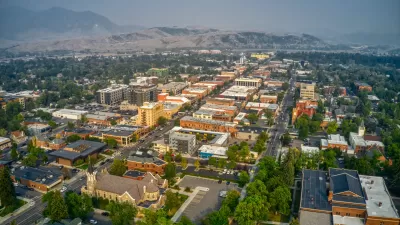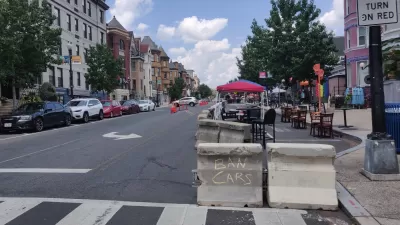Architect and urban innovator Andrés Duany has a new bone of contention: the usurping of the planning process by the public during the approval stage for new projects. Managing Editor Tim Halbur reports from Cambridge, Massachusetts.
"We need to reform the public process."
 Andrés Duany stood in front of an audience of journalists chosen by the Lincoln Institute of Land Policy in Cambridge, brought together to raise the level of reporting on urban issues and compare notes on their own struggling industry. Impeccably groomed as always, Duany took to the podium with the wiry energy of a terrier.
Andrés Duany stood in front of an audience of journalists chosen by the Lincoln Institute of Land Policy in Cambridge, brought together to raise the level of reporting on urban issues and compare notes on their own struggling industry. Impeccably groomed as always, Duany took to the podium with the wiry energy of a terrier.
"It's so out of control," said Duany, referring to the current state of public participation in planning decisions in the United States. "It's an absolute orgy of public process basically, we can't get anything done."
Charrettes – intensive design meetings where planners and architects work alongside the public to educate them on the city's proposals and coax out their own ideas on how their cities should be formed – have been a mainstay of Duany's practice for years, so he's no stranger to public engagement. But now he is saying what many involved in land use have come to believe but can't really say – that the process of soliciting the public's opinion has gotten out of hand and needs to be reformed.
The central problem, according to Duany, is that the immediate neighbors to a proposed development are brought in to speak on behalf of the whole community. These neighbors obviously have a vested interest in what happens in their backyard, and an emotional connection to their space. They also often have a financial stake in what happens, with their life's savings tied up in their home. "We've tainted the process by not understanding that the neighbors are a special interest," says Duany. "They are not the community."
Duany's proposed solution? A randomly-chosen group of citizens, brought in to represent the community similar to the jury system. Evidently such a system is alive and well in Perth, Australia, where a group of community members is chosen randomly, brought up to speed on the issues, and asked to give input on how development should occur. Without such a process, Duany says, the process is taken over by "a bunch of little mobs, invited in by idiot public planners."
Alternative energy projects are particularly at risk, according to Duany. The public at large sees the growing need for turbines and solar panels, but locals are fighting to keep them out of their neighborhoods. Is this the goal of city planners, who for the last couple of decades have worked passionately to create systems of bottom-up urbanism? Or is Duany right- is it time to create new models of public participation?
Tim Halbur is managing editor of Planetizen.

Planetizen Federal Action Tracker
A weekly monitor of how Trump’s orders and actions are impacting planners and planning in America.

Maui's Vacation Rental Debate Turns Ugly
Verbal attacks, misinformation campaigns and fistfights plague a high-stakes debate to convert thousands of vacation rentals into long-term housing.

Restaurant Patios Were a Pandemic Win — Why Were They so Hard to Keep?
Social distancing requirements and changes in travel patterns prompted cities to pilot new uses for street and sidewalk space. Then it got complicated.

In California Battle of Housing vs. Environment, Housing Just Won
A new state law significantly limits the power of CEQA, an environmental review law that served as a powerful tool for blocking new development.

Boulder Eliminates Parking Minimums Citywide
Officials estimate the cost of building a single underground parking space at up to $100,000.

Orange County, Florida Adopts Largest US “Sprawl Repair” Code
The ‘Orange Code’ seeks to rectify decades of sprawl-inducing, car-oriented development.
Urban Design for Planners 1: Software Tools
This six-course series explores essential urban design concepts using open source software and equips planners with the tools they need to participate fully in the urban design process.
Planning for Universal Design
Learn the tools for implementing Universal Design in planning regulations.
Heyer Gruel & Associates PA
JM Goldson LLC
Custer County Colorado
City of Camden Redevelopment Agency
City of Astoria
Transportation Research & Education Center (TREC) at Portland State University
Jefferson Parish Government
Camden Redevelopment Agency
City of Claremont




























